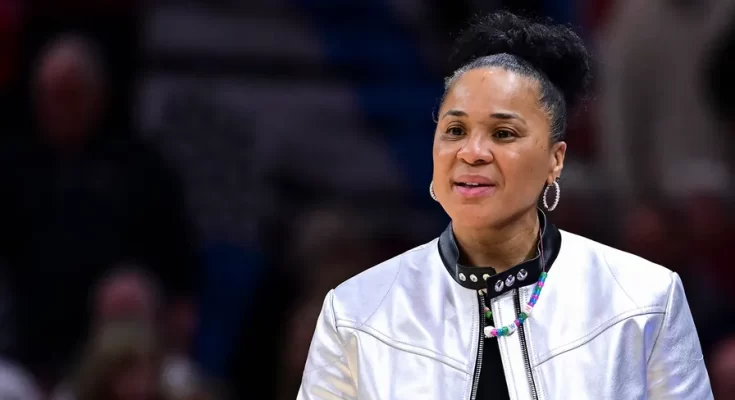Dawn Staley reveals she rejected Alabama coaching offer before landing job with South Carolina
Dawn Staley’s journey to becoming one of the most respected and successful coaches in women’s college basketball is a story of determination, vision, and an unwavering commitment to her principles. Her recent revelation about rejecting the coaching offer from the University of Alabama before ultimately accepting the head coaching position at the University of South Carolina adds a fascinating layer to her already remarkable career. This decision not only shaped her trajectory but also had a significant impact on the landscape of women’s college basketball.
Dawn Staley’s basketball career is legendary in its own right. Before she became a coach, she was a standout player, known for her leadership on the court, her fierce competitiveness, and her ability to elevate every team she was part of. As a player, Staley earned multiple accolades, including being a three-time Olympian and a Hall of Famer. She was celebrated for her skills as a guard, her basketball IQ, and her commitment to excellence. Transitioning into coaching, Staley carried that same intensity and drive, along with a deep understanding of the game, into her new role.
The offer from the University of Alabama came at a pivotal time in Staley’s coaching career. Alabama, with its storied athletic program and strong presence in the Southeastern Conference (SEC), presented an opportunity that many coaches would find hard to refuse. The chance to lead a major program in a competitive conference like the SEC could have propelled her career in numerous ways. However, Staley’s decision-making process was rooted not just in the prestige of the program but also in alignment with her values and long-term vision.
Rejecting Alabama’s offer was not an easy choice. It reflected a level of self-awareness and strategic thinking that many athletes and coaches never fully develop. Staley understood the importance of fit — how the culture of a program, the support from administration, the resources available, and the alignment with her coaching philosophy were crucial to her success. Alabama, despite its history and resources, did not feel like the right place for her to build her legacy. Staley was looking for a program where she could not only win games but also create a culture of empowerment, development, and lasting impact on young women both on and off the court.
The University of South Carolina, by contrast, offered a unique opportunity that aligned more closely with Staley’s vision. South Carolina was a program on the rise but had yet to reach the elite level she aspired to bring it to. The chance to lead a team in the SEC, within a supportive environment that valued women’s basketball, allowed Staley to shape the program in her image. It gave her the platform to develop players, build a winning culture, and make a meaningful impact on the community and the sport.
Staley’s decision underscores a critical lesson in leadership and career growth: success is not just about the opportunity that looks best on paper, but about the environment that enables you to thrive and make your greatest contributions. Her time at South Carolina has proven this philosophy right. Under her leadership, the Gamecocks have transformed into a national powerhouse, winning multiple SEC titles and a national championship. Her ability to recruit top talent, develop players, and build a cohesive, motivated team has made South Carolina a benchmark in women’s college basketball.
Moreover, Staley’s impact extends beyond wins and losses. She has become a mentor and role model for countless young athletes, emphasizing education, character, and leadership. Her coaching style reflects a balance of toughness and compassion, pushing her players to excel while supporting their growth as individuals. This holistic approach to coaching is part of why her decision to join South Carolina was so impactful; it was a place where she could implement her vision fully.
The story of rejecting Alabama’s offer also highlights the complexities women coaches often face in collegiate athletics. Opportunities can be rare and highly competitive, yet finding the right fit is essential for sustainable success. Staley’s careful consideration and ultimate choice serve as an inspiration for aspiring coaches, demonstrating that patience and principles can lead to extraordinary outcomes.
Her rise at South Carolina has also contributed to the growing prominence of women’s basketball in the SEC and nationally. Staley’s success has helped elevate the profile of the sport, drawing more fans, media attention, and support for women’s programs. She has become a voice for gender equity in sports, advocating for better resources, visibility, and respect for women’s basketball.
Reflecting on Staley’s career, it’s clear that rejecting the Alabama offer was not a missed opportunity but rather a defining moment of clarity. It was a choice that demonstrated her commitment to building something lasting and meaningful, rather than simply taking the easiest or most prestigious path. This decision led to a partnership with South Carolina that has flourished, bringing championships, recognition, and a legacy that will endure long after she retires from coaching.
In the broader context of college athletics, Staley’s story encourages a re-examination of how coaching decisions are made and the values that guide them. It challenges the notion that success is only about chasing the highest-profile jobs and instead promotes the idea that true leadership involves discernment, vision, and a willingness to invest in the right environment.
Ultimately, Dawn Staley’s journey from player to coach, and her choice to decline Alabama in favor of South Carolina, epitomizes the power of integrity and strategic thinking in sports. It is a testament to her character and her belief that success is measured not just by trophies but by the positive influence one has on a team, a program, and the lives of young athletes. Her story will continue to inspire coaches and players alike, reminding everyone that sometimes the most important wins happen off the court.



